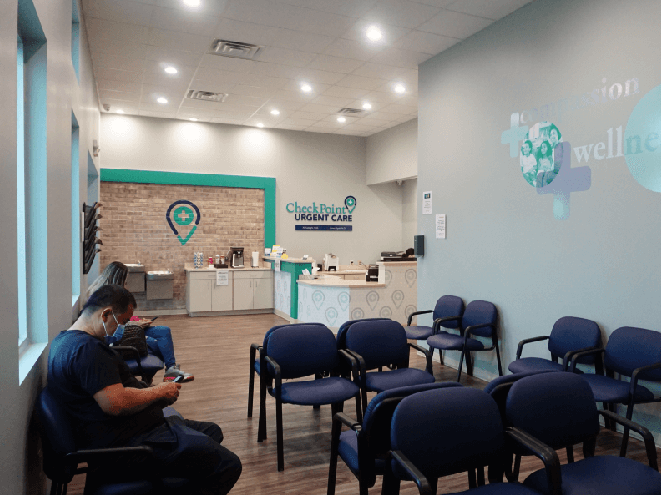Psoriasis: What You Need to Know
Psoriasis is more than just a skin condition – it’s a chronic autoimmune disorder that affects millions of Americans and can significantly impact quality of life. While it may seem daunting to receive a psoriasis diagnosis, understanding the condition and knowing your treatment options can help you take control of your skin health. CheckPoint Urgent Care is here to help.
What is Psoriasis?
At its core, psoriasis occurs when your immune system goes into overdrive, causing skin cells to multiply much faster than normal. While healthy skin cells typically grow and shed in a month-long cycle, psoriasis causes this process to happen in just days. This rapid growth results in a buildup of cells on the skin’s surface, creating thick, scaly patches called plaques.
Common Symptoms
The symptoms of psoriasis can vary from person to person, but typically include:
Red, inflamed patches of skin covered with silvery scales Dry, cracked skin that may bleed Itching, burning, or soreness Thickened, pitted, or ridged nails Swollen and stiff joints
These symptoms most commonly appear on the elbows, knees, scalp, and lower back, though they can affect any part of the body. For some people, the patches may be small and localized, while others may experience more widespread involvement.
What Causes Psoriasis?
Scientists believe psoriasis develops due to a combination of genetic and environmental factors. While the exact cause isn’t fully understood, we know that certain triggers can cause flare-ups or worsen existing symptoms:
Stress Infections Cold weather Certain medications Skin injuries Smoking Excessive alcohol consumption
Types of Psoriasis
There are several different types of psoriasis, each with its own characteristics:
- Plaque Psoriasis: The most common form, characterized by raised, red patches covered with silvery scales.
- Guttate Psoriasis: Appears as small, dot-like lesions, often triggered by bacterial infections.
- Inverse Psoriasis: Occurs in skin folds and appears as smooth, red patches.
- Pustular Psoriasis: Characterized by white, pus-filled blisters surrounded by red skin.
- Erythrodermic Psoriasis: A severe, potentially life-threatening form that can cover the entire body.
Treatment Options
While there’s no cure for psoriasis, various treatments can help manage symptoms and reduce flare-ups. Treatment plans are typically personalized based on the severity of symptoms, type of psoriasis, and individual response to different therapies.
Topical Treatments
Often the first line of defense, these include:
- Corticosteroids to reduce inflammation
- Vitamin D analogues to slow skin cell growth
- Retinoids to reduce inflammation and skin cell production
- Coal tar to reduce scaling, itching, and inflammation
Light Therapy
Controlled exposure to natural or artificial UV light can help slow skin cell growth and reduce inflammation. Options include:
- Natural sunlight (with careful monitoring)
- UVB phototherapy
- Excimer laser therapy
- PUVA (psoralen plus ultraviolet A)
Systemic Medications
For moderate to severe cases, oral or injectable medications may be prescribed:
- Methotrexate
- Cyclosporine
- Biologics (newer drugs that target specific parts of the immune system)
Living with Psoriasis
Managing psoriasis goes beyond medical treatment. Lifestyle changes can help reduce flare-ups and improve overall well-being:
- Keep your skin moisturized: Regular use of heavy moisturizers can reduce scaling and itching.
- Maintain a healthy lifestyle: Regular exercise, stress management, and a balanced diet can help control symptoms.
- Avoid triggers: Identify and avoid personal triggers that worsen your symptoms.
- Join support groups: Connecting with others who have psoriasis can provide emotional support and practical tips.
When to Visit CheckPoint
Visit CheckPoint Urgent Care if you:
- Experience severe or widespread symptoms
- Develop joint pain or swelling
- Find that over-the-counter treatments aren’t effective
- Notice signs of infection in affected areas
- Have symptoms that significantly impact your daily life
CheckPoint Urgent Care
Our medical professionals can evaluate your condition, identify triggers, and develop a personalized treatment plan to help you manage your psoriasis effectively.
Remember, psoriasis is a manageable condition, and with proper treatment and care, most people can achieve clearer skin and improved quality of life. Don’t hesitate to reach out to us to guide you through your treatment journey and help you find the most effective solutions for your specific situation.








